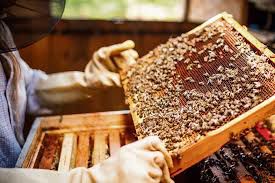Manav Mander
Ludhiana, July 17
The onset of rainy season brings a dramatic shift in the landscape, transforming parched fields into lush green carpets. For honey bees, this season of showers is a mixed blessing. While the rains nourish the flowers that bees rely on for nectar, it also threaten the colony’s health and productivity.
“Punjab produces 15,000-20,000 tonnes of honey annually. From July to mid-September, the rainy season ushers in a host of challenges for the bee colonies. Rain showers, cloudy conditions, and high humidity pervading the hives seriously trouble bee foraging and colony productivity. The diminished nectar and pollen collection slows down the egg-laying of the queen bee and weakens the entire colony,” said Gurpreet Singh Makkar, Senior Extension Scientist (Entomology), Punjab Agricultural University. PAU Experts share the tips:
Rain-proofing the hive: The first line of defence
- Hive placement: Ensure hives are placed on iron stands. Do not keep the colonies in the low-lying fields where water accumulates during the rainy season.
- Wood quality of hives and proper roofing: Langstroth bee hives should be made of soft, durable and decay-proof wood.
- Seal cracks and gaps: Regularly inspect hives for cracks and gaps that could let in the rainwater.
Internal hive environment: Ventilation is the key
- n Colony inspection and cleaning: Before the onset of the rainy season, clean all the debris from the bottom board. Check the colonies for any infestation of wax moths and destroy the eggs or larvae concealed in the crack or crevices.
- n Ventilation: Adequate ventilation prevents moisture build-up inside the hive and facilitates bees in performing their in-house tasks efficiently.
Nutritional support: Feeding through the dearth period n Honey reserves: Ensure that colonies have ample honey reserves before the rainy season starts. This foresight reduces the need for supplemental feeding during prolonged rains.
- Supplemental feeding: Provide supplemental feed of sugar syrup in the colonies to meet the carbohydrate requirements of the bees.
- Pollen supplementation: Supplementing pollen or pollen substitutes can help sustain brood rearing during periods when natural pollen is scarce. Pollen substitutes help in maintaining protein levels and brood rearing.
Guarding the hive: Robbing and other bee enemies
- Reducing hive entrance size: Smaller hive entrances make it easier for guard bees to defend during dearth periods.
- Careful feeding of bees: Uniform supplementation of feed in all colonies especially during the evening hours fairly reduces the risk of attracting robbers from other colonies in an apiary.
- Maintaining strong colonies: Unlike weak colonies, strong colonies have a stronger workforce of guard bees.
- Measures to stop ongoing robbing: Make colonies bee-tight by sealing all cracks/crevices in a hive to ensure that bees may be able to enter the colony only through the hive entrance.
- Fumigating and storing empty combs: Fumigation helps eliminate pests such as greater wax moths, lesser wax moths, and disease pathogens that can harm the combs and, subsequently, a bee colony.
Unlock Exclusive Insights with The Tribune Premium
Take your experience further with Premium access.
Thought-provoking Opinions, Expert Analysis, In-depth Insights and other Member Only Benefits
Already a Member? Sign In Now











